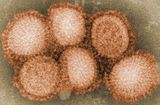
Back Russische Grippe 1977/1978 German Gripe rusa de 1977 Spanish دنیاگیری آنفولانزا ۱۹۷۷ روسیه Persian Grippe russe de 1977 French Flu Rusia 1977 ID Influenza russa del 1977 Italian Gilípi ya Rusí (1977/1978) Lingala Gripe russa de 1977 Portuguese 1977 Russian flu SIMPLE 1977-1979 Rus gribi Turkish
| Influenza (flu) |
|---|
 |
The 1977 Russian flu was an influenza pandemic that was first reported by the Soviet Union in 1977 and lasted until 1979.[1][2] The outbreak in northern China started in May 1977, slightly earlier than that in the Soviet Union.[3][4] The pandemic mostly affected a population younger than 25 or 26 years of age,[1][5][6] and was described as mild.[6] It was caused by an H1N1 flu strain which highly resembled a virus strain circulating worldwide from 1946 to 1957.[1][2][5][6] Genetic analysis and several unusual characteristics of the 1977 Russian flu have prompted many researchers to say that the virus was released to the public through a laboratory accident,[4][5][7][8][9][10] or resulted from a live-vaccine trial escape.[5][11]
- ^ a b c "Influenza Pandemic Plan. The Role of WHO and Guidelines for National and Regional Planning" (PDF). World Health Organization. April 1999. pp. 38, 41. Archived (PDF) from the original on 2020-12-03.
- ^ a b Mermel LA (June 2009). "Swine-origin influenza virus in young age groups". Lancet. 373 (9681): 2108–9. doi:10.1016/S0140-6736(09)61145-4. PMID 19541030. S2CID 27656702. Archived from the original on 2021-07-27. Retrieved 2021-01-24.
- ^ Kung HC, Jen KF, Yuan WC, Tien SF, Chu CM (1978). "Influenza in China in 1977: recurrence of influenzavirus A subtype H1N1". Bulletin of the World Health Organization. 56 (6): 913–8. PMC 2395678. PMID 310732.
- ^ a b Wertheim JO (June 2010). "The re-emergence of H1N1 influenza virus in 1977: a cautionary tale for estimating divergence times using biologically unrealistic sampling dates". PLOS ONE. 5 (6): e11184. Bibcode:2010PLoSO...511184W. doi:10.1371/journal.pone.0011184. PMC 2887442. PMID 20567599.
- ^ a b c d Rozo M, Gronvall GK (August 2015). "The Reemergent 1977 H1N1 Strain and the Gain-of-Function Debate". mBio. 6 (4). doi:10.1128/mBio.01013-15. PMC 4542197. PMID 26286690.
- ^ a b c Gregg MB, Hinman AR, Craven RB (November 1978). "The Russian flu. Its history and implications for this year's influenza season". JAMA. 240 (21): 2260–3. doi:10.1001/jama.240.21.2260. PMID 702749. Archived from the original on 2020-04-23. Retrieved 2021-01-24.
- ^ Furmanski M (September 2015). "The 1977 H1N1 Influenza Virus Reemergence Demonstrated Gain-of-Function Hazards". mBio. 6 (5): e01434-15. doi:10.1128/mBio.01434-15. PMC 4611044. PMID 26419881.
- ^ Zimmer SM, Burke DS (July 2009). "Historical perspective--Emergence of influenza A (H1N1) viruses". The New England Journal of Medicine. 361 (3): 279–85. doi:10.1056/NEJMra0904322. PMID 19564632.
- ^ Horimoto T, Kawaoka Y (August 2005). "Influenza: lessons from past pandemics, warnings from current incidents". Nature Reviews. Microbiology. 3 (8): 591–600. doi:10.1038/nrmicro1208. PMID 16064053. S2CID 30154845.
- ^ Nolan, Tom (2009-07-02). "Was H1N1 leaked from a laboratory?". The BMJ. Archived from the original on 2016-06-16. Retrieved 2021-01-24.
- ^ Cite error: The named reference
:24was invoked but never defined (see the help page).